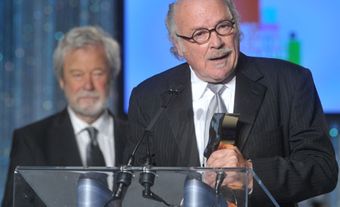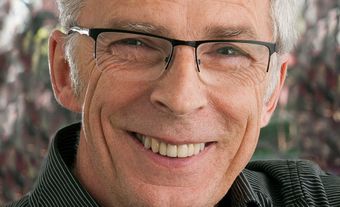Film Festivals
Film festivals encourage interest and investment in cinema. They are part celebration, part film appreciation and part commercial exchange, and they have helped raise the profile of Canadian films and filmmakers at home and abroad. They attract large local audiences - particularly in Montréal, Toronto and Vancouver - and the international media. They have helped to shape awareness and film appreciation, and to develop audience interest in both Canadian and international cinema.
The first organized film festival in Canada took place in Yorkton, Sask, in 1950. The festival was the initiative of James Lysyshyn, an employee of the NATIONAL FILM BOARD OF CANADA (NFB). The Yorkton Film Council was established in 1947 and the Yorkton International Documentary Film Festival began operations 3 years later. In 1969 the Yorkton Film Council disbanded and since 1971 the festival has been run by the Yorkton International Film Festival Society. The festival has gone through several name changes, and in 1977 the international component was dropped, giving the festival a strictly Canadian focus. Now known as the Yorkton Film Festival, it is the longest-running continuous film festival in North America, and awards the prestigious Golden Sheaf Award, first given in 1958. Winning films tour the province after the event.
In 1956 Gerald PRATLEY, a Toronto-based film critic who hosted CBC Radio's "This Week in the Movies" (the first show of its kind in Canada to deal seriously with film appreciation), was asked to run a modest film festival for 2 weeks in a rented theatre in Stratford, Ont. The Stratford Film Festival ran concurrent with the Shakespeare festival; however, it was suspended by artistic director Michael Langham in 1961. In 1971 it was revived by Pratley, then head of the Ontario Film Institute, and ran successfully until 1975, when festival director Robin PHILLIPS suspended it a second time.
In 1960, a festival was established in a major Canadian city when a group of professionals and film enthusiasts founded the Festival International du Film de Montréal. This non-competitive annual event lasted for 8 years, at first taking place at the Loew's Theatre on Ste. Catherine Street and, after 1967, at the theatre built for EXPO 67. In 1962, Rock DEMERS, the new manager, established it as a competition under the name of the Festival du cinéma canadien. The festival drew together everyone in the Québec film industry with players on the international scene. It was the crucible for new projects and theories in Canadian film as well as the source for the promotion of repertory theatres in Montréal specializing in art and experimental films. After its lapse, nearly 10 years passed before another international film festival - the Festival des films du monde (Montréal World Film Festival) - was reborn in the city.
In 1971, Claude Chamberlan and Dimitri Eipides, with an avant-garde commitment to experimental and underground films, founded in Montréal the Festival international du film en 16 mm, which in 1980 became the Festival international du nouveau cinéma. With programs that reflect the current state of cinema and explore the margins of cinematic experimentation, this non-competitive festival is the second-longest-running in Canada. At its 25th meeting in 1997, the Festival international du cinéma et des nouveaux médias de Montréal renewed itself by adopting an even more experimental focus. Today it is known as the Festival du nouveau cinéma.
In recognition of Canadian expertise in documentaries and in honour of John GRIERSON, Canada's first film commissioner at the NFB (1939-45), the Ontario Film Association (an organization of Ontario high school teachers) created the Grierson Documentary Seminar in 1975. The seminar, which operated more like a retreat for invited filmmakers in such locations as Niagara-on-the-Lake, Ont, was held annually. It brought together filmmakers, educators, students, critics and other professionals from around the world in high-quality discussions and debates about documentaries. It was, however, discontinued in 1989.
The Ottawa International Animation Festival was also launched in 1975 as a biannual event by the Canadian Film Institute (CFI) in conjunction with the International Animated Film Association. Along with Zagreb in Croatia, Annecy in France, and Hiroshima in Japan, this festival belongs to the world circuit of animated film festivals. The event became annual in 2005 and is now solely operated by the CFI. It is the largest animation festival held in North America.
In 1976, film producers Bill Marshall and Henk van der Kolk and lawyer Dusty Cohl founded the Toronto Festival of Festivals. After 2 years under the direction of Marshall, Wayne Clarkson from the CFI was hired to run the event. On his watch, the Festival of Festivals gradually grew in importance. In 1984, the festival lunched Perspective Canada, devoted to Canadian filmmakers, and one of the most popular of the festival's many programs. In conjunction with Perspective Canada, the festival organized the largest retrospective of Canadian films ever held in Canada and published The Film Companion, edited by noted Canadian film historian Peter Morris. In the 1980s the festival continued to grow under the leadership of Helga Stephenson and Piers Handling. In 1994, it was renamed the Toronto International Film Festival and took over the operation of the Ontario Film Institute. Today it operates the Cinematheque Ontario, The Film Reference Library, and in terms of the number of films shown and prestige - in the 1990s it became a launching pad for Oscar-worthy Hollywood films - it is the largest film festival in North America, and internationally second only to the Cannes Film Festival. Although it is non-competitive, it hands out the People's Choice Award and several awards to Canadian films and filmmakers. In 2010, the Bell Lightbox, its new five-storey corporate headquarters, opened in downtown Toronto.
In 1977, 2 film festivals began a few weeks apart in Montréal - the Festival international du film de la critique québécoise and the Festival canadien des films du monde. The first met only twice, in 1977 and 1978. The second, which was an outgrowth of the Canadian Student Film Festival (launched in 1969 by Serge Losique), became known as the Festival des films du monde (Montréal World Film Festival) in 1978. It is a competitive festival and the only Canadian film festival to be officially recognized by the Fédération Internationale des Associations de Producteurs de Films (FIAPF).
The Banff Television Festival, founded in 1979, has acquired an international reputation that is the envy of similar festivals. The magnificent setting of the Banff Springs Hotel in the ROCKY MOUNTAINS has attracted the most influential people in the world of television production and programming. Each year the "Rockies" are awarded in several categories. Two larger cities on the east and west coasts took longer to establish international festivals to bring the world's best films to their regions. The Atlantic Film Festival was established in Halifax in 1981 and the Vancouver International Film Festival started up in 1982. Audience prizes are awarded at each festival.
In 1981, René Rozon began Montréal's International Festival of Films on Art (FIFA), now recognized as the major venue for this genre. An international jury awards the Grand Prix du Festival in several categories and gives out grants in aid of production. The widest panorama of Québec's annual production in all film genres is available in a major event with a history parallel to recent Québec film history. Semaine du cinéma québécois, founded in 1973, was the brainchild of Carl Mailhot. Its goal remains to offer film lovers and professionals the best annual production. As the Rendez-vous d'Automne, the event made a new start under the leadership of René Roy in 1982. Roy was succeeded by Louise Carré (1983-85), and Michel Coulombe began managing the festival in 1986. The Prix de la critique québécoise de cinéma is awarded in several categories. For some years, the films shown at this event have been shown elsewhere in Québec and in Vancouver and Toronto.
A new burst of regional initiative came about in 1982 with the founding by Jacques Matte at Rouyn-Noranda of the Festival du cinéma international en Abitibi-Témiscamingue. Known for its warm welcome and enthusiastic audiences, this event is run by local as well as foreign filmmakers. The major award here is the Prix du public Hydro-Québec. A similar initiative dating from 1983 is the Carrousel international du film de Rimouski, dedicated to films for young audiences. Workshops and presentations by filmmakers from all over the world give life to this festival. A jury made up of 10- to 15-year-olds from Europe and America awards the Prix Camérios in several categories. In 1985 a group of women in Montréal organized the Festival international de films et videos de femmes. This event ran until 1990. Since 1991 it has alternated with La Mondiale des films et videos de femmes de Québec. The meetings at Montréal in 1992, 1994 and 1996 shared the title "Silence elles tournent."
Vues d'Afrique journées du cinéma africaine et créole, founded in 1985 by Gérard Le Chêne in Montréal, assembles films and videos that are made by African and Arab directors or deal thematically with Africa, even though made in Canada. Twinned for some years with the Festival Panafricain de Ouagadougou (in Burkina Faso), as well as with the Festival of Amiens (France), its program is partially shown in several Canadian cities. Prizes from Communication Interculturelle are given out in several categories.
At the initiative of Wyndham Wise, then executive director of the Canadian Independent Film Caucus (now the Documentary Organization of Canada), the Hot Docs Canadian International Documentary Festival was launched in 1994 by a team led by Debbie Nightingale. Although not directly related to its precursor, the Grierson Seminar, Hot Docs filled the void it left. For the first 5 years, Hot Docs served as a promotional vehicle for Caucus filmmakers; however, in 1998, Chris McDonald, formerly of the CANADIAN FILM CENTRE, was hired as its first full-time employee and the festival was put on a more professional footing. Today it is the premiere North American documentary film festival. It assembles high-quality Canadian and international documentaries and organizes seminars and workshops on the financial aspects of production. Prizes are also given out to the best Canadian and international documentary films.
The 1980s and 1990s saw an explosion of festivals nationwide, with a great many events sponsored by cities and special interest groups. The following is only a partial list of film festivals operating in Canada today: the St. John's International Women's Film Festival, Cinéfest Sudbury International Film Festival, Inside Out Toronto LGBT Film and Video Festival (now the second-largest festival held in Toronto in terms of audience attendance), Toronto's Images Festival of Independent Film and Video, the Calgary International Film Festival, the Edmonton International Film Festival and the Victoria Film Festival.

 Share on Facebook
Share on Facebook Share on X
Share on X Share by Email
Share by Email Share on Google Classroom
Share on Google Classroom


